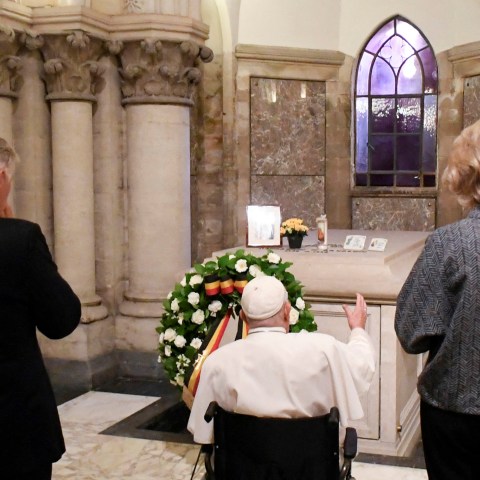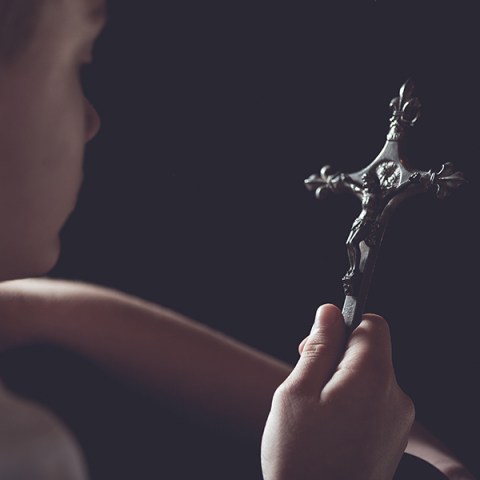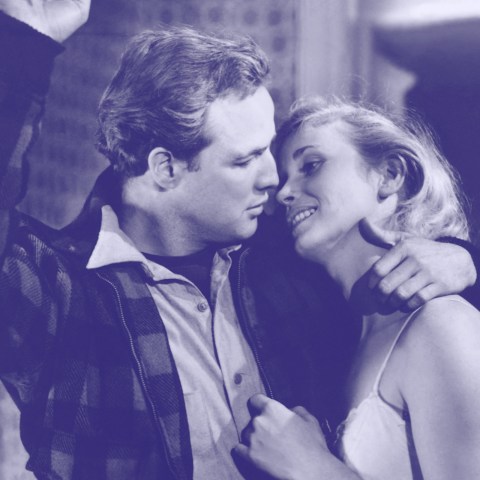They couldn’t believe it.
The prisoners already knew that the ten men selected to die would do so in the most horrific fashion, but then he did it. It was unthinkable.
But, then again, it was Fr. Maximilian Kolbe.
Having endured a hellish night standing at back-breaking attention during “roll call”, the prisoners on Auschwitz’s Block 14a nearly collapsed from cold, hunger and exhaustion. Their transgression? After a day of murderous labor, the gaunt prisoners in vertically-striped uniforms returned to camp with one less member in the group. And so, a dazed, yet terrified group began to hear the bark of a cold German voice from a black-tunicked officer.
Because a prisoner escaped from your block and you did not prevent it or stop it, ten of you will die of starvation in order that the others will remember that even the smallest attempts to escape will not be tolerated.
What followed was death handed out by a passing SS officer as, one-by-one, he pointed and spat out, “Du!” (you!). While standing in formation, Polish prisoner, Michal Micherdzinski, recalled what happened (in an interview years later),
“Du!” sounded like a hammer hitting an empty chest. Everyone was afraid that anytime the finger might point at him…The SS-man walked [between the lines of men] and again said, “Du! Du!” Our hearts thudded. With noise in our heads, the blood throbbed in our temples, and it seemed to us that the blood would spring out of our noses, ears, and eyes. It was something tragic.
The tenth prisoner selected to die in the “hunger bunker” was Polish officer Franciszek Gajowniczek. And when he heard, “Du!”, he nearly collapsed uttering, “Jesus, Mary! My wife, my children!” Stumbling to the front, the ten men knew their fate was sealed.
But that is when Fr. Maximillian Kolbe did it.
Shuffling in his oversized clogs, he broke ranks and walked toward the SS officers in front of standing prisoners. As Micherdzinksi recalled,
Everyone shivered, since this was breaking one of the most insisted upon rules, the breaking of which was brutally punished. The exit from the row meant death…We were certain that they would kill Fr. Maximilian, before he managed to get through. But something extraordinary happened that was unheard of in the history of seven hundred concentration camps [of] the Third Reich. It never happened that a prisoner of a camp could leave the row without being punished. It was something so unimaginable for SS men that they stood dumbfounded. They looked at each other and didn’t know what was happening…[Fr. Maximilian] didn’t walk like a beggar, nor like a hero. He walked like a man conscious of a great mission. He stood calmly before [the] officers.
More shocked than irate, the SS camp commandant spewed the question, “What does this Polish swine want?” To which, Fr. Kolbe simply responded while gesturing to Franciszek Gajowniczek, “I want to die instead of him.”
When asked who he was, Fr. Kolbe explained that he was a Polish Catholic priest. Micherdzinksi continued,
For SS men, the priest was a twinge of conscience. It is interesting that, in this dialogue, Fr. Maximilian did not once use the word “please”. With his statement, [Fr. Maximilian] broke the German authority to judge with the usurped right to decide on life and death, and he forced them to change the sentence. He behaved like an experienced diplomat. Only instead of a tailcoat, a sash, and medals, he presented himself in a striped prison garb, a bowl, and clogs. The deathly silence prevailed, and every second seemed to last centuries.
And them, according to Micherdzinski, the unthinkable happened,
The SS captain turned to Fr. Maximilian and addressed him formally with “Sie” (formal “you”) and then asked, “Why would you want to die instead of him?” All canons, which the SS man confessed earlier, fell apart. A moment ago he called him the “Polish swine,” and now is turning to him with “Sie”. The SS men and non-commissioned officers standing beside him weren’t sure whether they heard right. Only one time in the history of concentration camps had the high-ranking officer who murdered thousands of people addressed the prisoner this way. Fr. Maximilian answered, “He has a wife and children.” It is the entire catechism in a nutshell…He thought his life [as a priest] was [worth less] than the life of the father of a family! It was a wonderful lesson in catechism!
Fr. Kolbe would die in the starvation bunker…in the place of Franciszek Gajowniczek. But not without singing hymns, uttering prayers, providing absolution and offering incomparable comfort to the nine men dying around and with him.
In 1982, at Fr. Maximilian Kolbe’s canonization at the Vatican, Pope John Paul II would remind,
Yes, at the base of this holiness lies the great, but deeply painful question of humanity. This difficult tragic era, marked by the terrible trampling of human dignity, yet in Auschwitz was born its saving sign. Love proved stronger than death, stronger than the anti-human system. Human love achieved its victory where hatred and contempt for human beings seemed to triumph.
And the spared Franciszek Gajowniczek was there to hear it.
In 1994, just one year before he would die, Franciszek Gajowniczek visited the St. Maximilian Kolbe Catholic Church in Houston, Texas. Through his translator, he firmly declared, “so long as he … has breath in his lungs, he would consider it his duty to tell people about the heroic act of love by Maximilian Kolbe.”
G.K. Chesterton once said,
We have all read in scientific books, and, indeed, in all romances, the story of the man who has forgotten his name. This man walks about the streets and can see and appreciate everything; only he cannot remember who he is. Well, every man is that man in the story. Every man has forgotten who he is…We are all under the same mental calamity; we have all forgotten our names. We have all forgotten what we really are.
In their proud wickedness, the SS officers forgot. In their dejected suffering, the Auschwitz prisoners forgot. In our daily trials and distractions, we forget.
We are dignified children of God.
Indeed.
And that’s what St. Maximilian Kolbe reminded us.
To read Michal Micherdzinski’s interview in full, click here.
Photo credit: Pixabay








